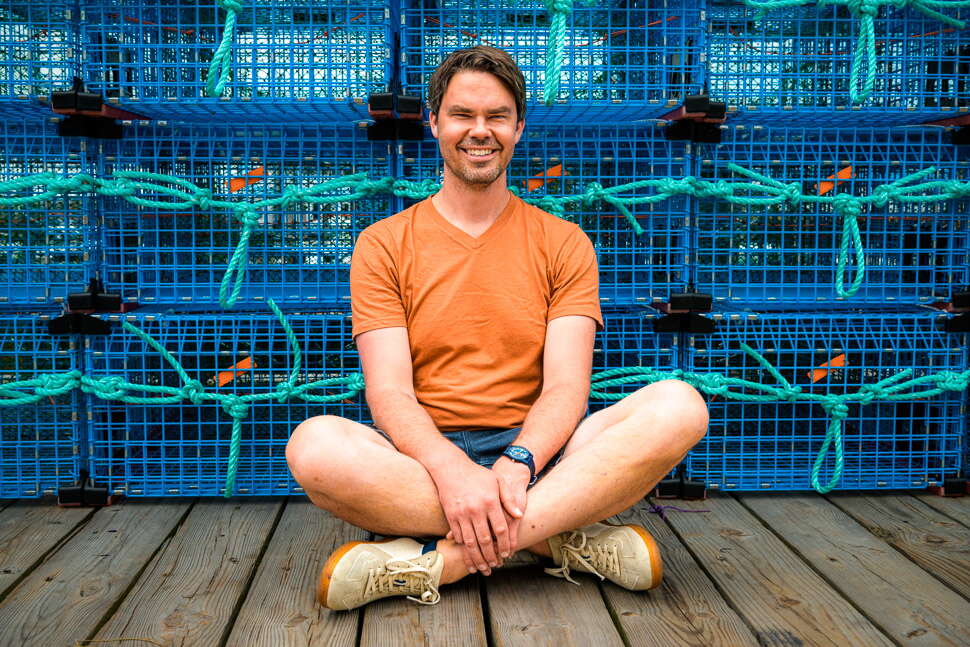
Making waves in Maine: ‘Lift All Boats’ program mentors teens in the art of lobstering
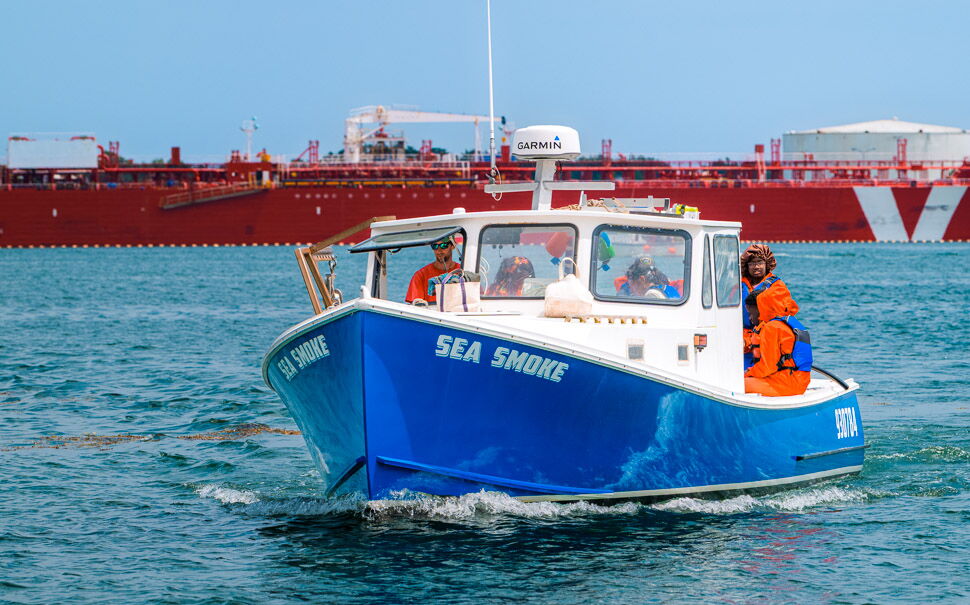 Photo / Jim Neuger
The Sea Smoke returns to Portland Pier after a morning of lobstering.
Photo / Jim Neuger
The Sea Smoke returns to Portland Pier after a morning of lobstering.
On a sweltering day in early July, the navy-blue and white Sea Smoke — a 32-foot Holland lobster boat — pulls into Portland Harbor with a crew of young lobstermen and women hauling freshly caught crustaceans piled high inside bright blue barrels.
Clad in lobstering’s trademark bright orange garb, the teenage crew supervised by Miranda Shinn attaches plastic containers to chains hoisted by crane into the Luke’s Lobster buying station next to the eponymous waterfront restaurant. The clawed critters are marked with different color tape strips — orange, yellow, blue and so on — according to who caught them, in order to track whom to credit for each catch.
Before the lobsters are plunked into temperature-controlled tanks, they are weighed and counted so the crew members can get paid, the amounts recorded on handwritten receipts.
“We are lit!” one boy exclaims as he trades high fives with a fellow seafarer, while a female peer laughs about breaking her own three-lobster “curse” to bring back five that day.
As they finish lunch while filling in their logbooks about what they caught and where — a requirement for student license holders — the next group starts prepping traps with buoys and bait for the afternoon outing as part of a summer mentorship program called Lift All Boats.

Bridging the gap
Launched in 2022 by Luke’s Lobster founders Luke Holden and Ben Conniff, Lift All Boats aims to give high school students an entry point into lobstering either as a hobby or livelihood. With some exceptions, most are based in the Portland area.
“The program is intended for students who don’t have existing connections to the lobster industry,” says Conniff, chief innovation officer at Luke’s Lobster.
Currently the way the fishery is set up, the only way to get a commercial license is either to spend 14 years on a wait list or get a student license at a very young age — something only kids from lobstering families tend to be privy to.
“Lift All Boats exists to offer that opportunity to kids without those insider connections but who still have a lot to offer the industry,” Conniff says. “The goal is to bridge the gap between students who would have no pathway into lobstering but may love it, and lobstermen who are having trouble finding young people who want to join the industry and train as their sternmen.”
Patrice McCarron, executive director of the Kennebunk-based Maine Lobstermen’s Association, says the program comes at a time of transition for a tradition-bound industry, with a growing number of retirements creating opportunities for newcomers in various roles.
“What the program is doing is really innovative,” she says.
Lift All Boats started with four participants in 2022, growing every year and including some who’ve stuck with the program as they’ve started college. This year’s 30-strong cohort includes 20 returnees. Despite the underrepresentation of women in lobstering and shortage of training opportunities, more than a third of participants — and half of this year’s group — are female.
“For our industry to thrive, we need the broadest pool of talent possible,” Conniff says.
Catching the spirit
Esperanza, a 16-year-old rising senior at South Portland High School, is in this year’s group.
“I really like the community and the team aspect of working with a group,” she says.
She also says she’s learned “that lobstering is an incredibly competitive field, and that some lobstermen will do anything to make sure their traps aren’t tampered with.” Keeping her career options open, she says she’d love to become a midwife, OB-GYN or anthropologist.
From late June through late August, lobstering trainees spend more than 50 hours on the water and the docks learning how to set and haul traps, maintain their gear and safely operate a boat under professional supervision.
Despite growing up so near the ocean, for many it’s their first time on the water.
“I was a little nervous at first,” admits 16-year-old David, a rising sophomore at South Portland High School who started the program as a freshman. “I was always thinking, ‘What if the boat tips over?’ We’ve got all these traps.” It never did, and now he finds that “the rougher the waves, the more exciting” the outing. He’d like to attend college on a basketball or football scholarship.
As for his harvest, “I had my worst day when I caught five lobsters, but that’s still pretty good,” David says on the dock before setting off on the boat. “Catching any lobster is good!”
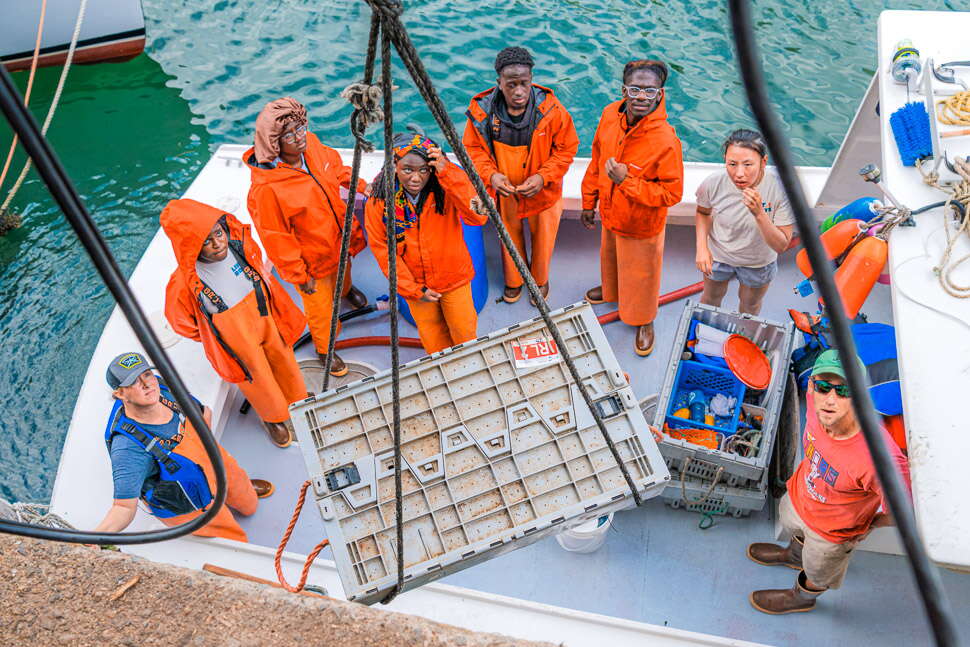
Charting the next chapter
In addition to financing and staffing the program, Luke’s Lobster — a wholesale and retail business with restaurants known as “shacks” on both U.S. coasts as well as Japan and Singapore — relies on donations of funds and equipment.
With an eye toward expansion, Lift All Boats gained official designation as a nonprofit in 2025.
“It will be much easier for foundations and individuals to make the kind of game-changing donations that we need to meet student demand, funding another boat and increased staff and hopefully to replicate what we are doing to a second location,” Conniff says.
Struck by those who have overcome initial fears of the water, he says, “We could all use some of that courage in our own lives.” Along the way, he’s also picked up some teen lingo, like another phrase for cool, awesome and stylish: “It turns out if someone says you have a ‘drippy fit,’ they don’t mean your clothes just got sprayed with the deck hose.”
Conniff says that the most committed students remain part of the program even after finishing, including seven who have worked or are currently working on lobster boats.
No matter what their career ambitions, participants pick up skills from time management to taking proper care of expensive equipment, notes Shinn, who manages the program.
“We’re teaching them the skills they need to be successful in any industry,” she says.
Youngsters also gain teamwork and communication skills, which Conniff says is “so important for a generation that spends so much of its time on screens.”
Israel, a 15-year-old student at Portland High School with dreams of becoming a computer engineer, considers lobstering “just a hobby for now.”
To anyone thinking of applying to Lift All Boats next year, his advice is to just give it a chance.
“Even if it seems like it’s going to be difficult, it’s going to be really fun in the end,” he says.






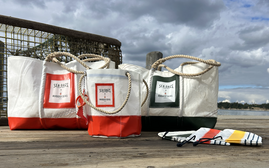

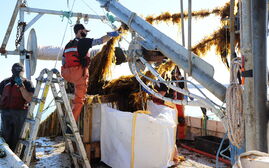





0 Comments